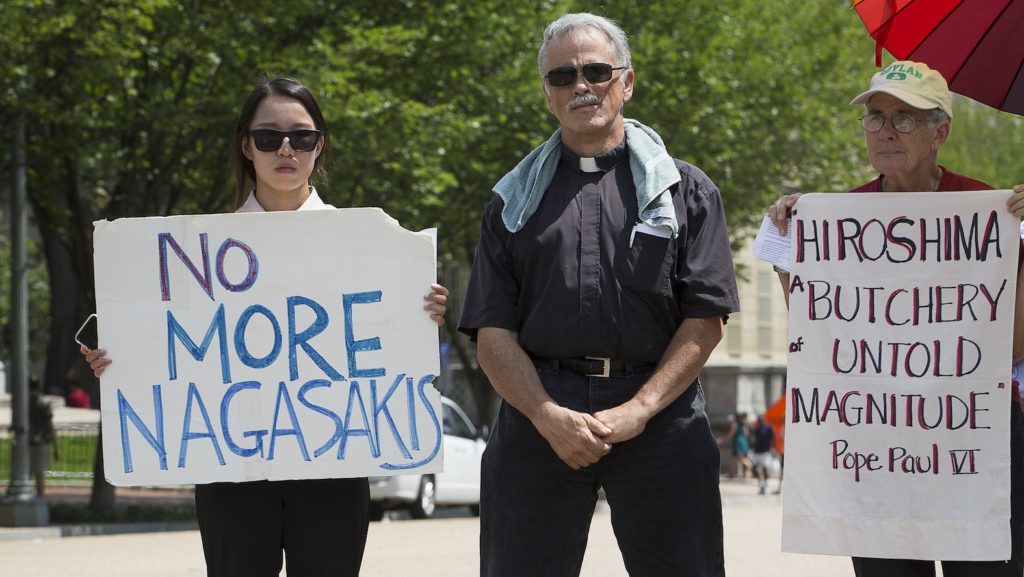With the Group of Seven countries set to meet in Japan this weekend, four Catholic bishops whose dioceses have ties to nuclear weapons have sent an open letter to those involved in the summit, imploring them to take major steps towards nuclear disarmament.
“We, the undersigned spiritual leaders of the Roman Catholic Church, urge you to use the upcoming summit of the International Group of Seven to undertake concrete steps toward global, verifiable nuclear disarmament,” states the letter signed by two American and two Japanese bishops.
The letter is signed by Archbishop John Wester of Santa Fe, Archbishop Paul Etienne of Seattle, Archbishop Peter Michiaki Nakamura of Nagasaki and Bishop Alexis Mitsuru Shirahama of Nagasaki.
The letter calls on G7 leaders to announce and commit to concrete steps to prevent a new arms race, guard against nuclear weapons use, and advance nuclear disarmament, as well as reiterate the sentiment G20 leaders put forth in November, that the threat and use of nuclear weapons is “inadmissible.”
The Catholic leaders also call the United States and Russia to engage in serious talks to renew full implementation of the New Strategic Arms Reduction Treaty, which is set to expire early in 2026. The two countries far and away have the most nuclear weapons in the world. Russia leads the way with 5,977. The U.S. has 5,428. China is third on the list with 350 nuclear weapons.
The Catholic leaders said the summit is an important opportunity for the G7 countries – France, the United States, the United Kingdom, Germany, Japan, Italy and Canada – to take steps towards nuclear disarmament, noting that the war in Ukraine is an example of why it’s imperative to do so.
They echoed the sentiment of Japanese Prime Minister Fumio Kishida, who said the summit presents a unique opportunity “to deepen discussions so that we can release a strong message toward realizing a world free of nuclear weapons” and to “demonstrate a firm commitment to absolutely reject the threat or use of nuclear weapons.”
“We strongly agree. We, therefore, urge you to use the summit to center international attention on the importance of nuclear arms control and disarmament and demonstrate a global commitment to nonproliferation efforts,” the letter states. “Rather than viewing the war in Ukraine as an overwhelming impediment toward making substantial progress, we view it instead as a clear demonstration of the absolute need to do so.”
“Throughout the years, world leaders have spoken about the need to eliminate the threat of nuclear weapons, prevent a new nuclear arms race, and avoid the ultimate catastrophe that is potentially civilization-ending nuclear war … But it is now time to translate rhetoric into action,” it continues.
The G7 summit is an annual gathering of leaders from the countries to discuss a wide range of topics. This year’s summit began today, and will run through Sunday, May 21.
Each diocese has a tie to nuclear weapons. The Archdiocese of Santa Fe is the diocese with the most spending on nuclear weapons in the United States, and contains two weapons laboratories and the nation’s largest nuclear weapons depository. The Archdiocese of Seattle is the diocese in the United States that has deployed the most strategic weapons. Meanwhile, the Dioceses of Hiroshima and Nagasaki are the only two dioceses to have suffered atomic attacks – when the United States bombed cities during World War II.
Wester in particular, has been especially outspoken about the need for nuclear disarmament in recent years. Last January, he published a pastoral letter, Living in the Light of Christ’s Peace: A Conversation Toward Nuclear Disarmament, sounding the alarm on the fact that “we are in a new nuclear arms race far more dangerous than the first.” That sentiment was echoed in the new letter to G7 leaders.
“We believe today’s new nuclear arms race is more dangerous than the first arms race, given multiple nuclear actors and the advent of new cyber and hypersonic weapons and artificial intelligence,” the letter states. “We strongly urge world leaders at the G7 Summit to show by example how international leadership is ready, willing, and able to work with nuclear weapons and non-nuclear weapons states to ensure no country or city ever suffers the horrors of nuclear war again.”

